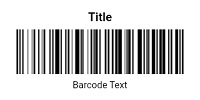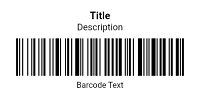The MSI-10 barcode, a variant of the MSI (Modified Plessey) barcode, is a numeric-only symbology developed by the MSI Data Corporation. It is designed for encoding numbers and includes a single check digit for error detection, making it suitable for applications requiring simple numeric data encoding and enhanced data integrity.
The MSI barcode was developed as an improvement over the Plessey code, primarily for use in inventory management and retail applications. The MSI-10 variant incorporates a modulo 10 check digit, adding an extra layer of accuracy and reliability in data capture and processing.
Technical Specifications
MSI-10 encodes numeric data (digits 0-9) and is structured to include a check digit for error detection. Each digit is represented by a unique pattern of bars and spaces of varying widths. The barcode starts and ends with a specific pattern, ensuring accurate scanning and data integrity. The check digit is calculated using the modulo 10 algorithm, which involves a series of multiplications and additions to ensure the correctness of the data.
Checksum Calculation
The modulo 10 check digit calculation for MSI-10 is performed as follows:
- Starting from the right, double every second digit.
- Sum all the digits, both the original and the doubled ones. If doubling a digit results in a two-digit number, add those two digits together.
- Subtract the sum from the nearest equal or higher multiple of 10.
- The resulting difference is the check digit, which is appended to the end of the barcode.
This method ensures that any errors during scanning or data entry are detected, improving the reliability of the barcode.
Advantages and Disadvantages
MSI-10 barcodes offer several advantages, including simplicity, reliability, and ease of implementation. Their numeric-only encoding makes them straightforward to read and process, while the modulo 10 check digit significantly enhances data accuracy. However, the symbology is limited to numeric data, which can be a drawback in applications requiring alphanumeric or special character encoding. Additionally, MSI-10 barcodes are generally larger than other barcode types with similar data capacity, which can be a limitation in space-constrained environments.
MSI-10 Applications
MSI-10 barcodes are widely used in applications where numeric data needs to be encoded and verified. They are particularly popular in:
- Inventory Management: Facilitates tracking and management of stock items in warehouses and retail stores. The check digit ensures that inventory data is accurate and reduces errors during scanning.
- Library Systems: Helps in cataloging and tracking books and other materials. Each item is assigned a unique barcode, simplifying the process of checking items in and out.
- Automated Systems: Used in various automated systems for sorting and tracking items, such as mail sorting and package delivery services.
Comparison with Other Barcode Symbologies
When compared to other barcode symbologies, MSI-10 stands out for its simplicity and reliability in numeric data encoding. Unlike alphanumeric barcodes like Code 128 or Code 39, MSI-10 is strictly numeric, making it less versatile but easier to implement in specific applications. It is also more error-resistant than barcodes without check digits, such as basic UPC codes, due to its built-in checksum.
The MSI-10 barcode is a practical and reliable solution for encoding numeric data with a focus on error detection and data integrity. Its development as a variant of the MSI barcode has made it a valuable tool in inventory management, library systems, and automated sorting applications. Despite its limitations in data capacity and versatility, the MSI-10 barcode remains a trusted choice for applications requiring accurate and straightforward numeric data encoding.


